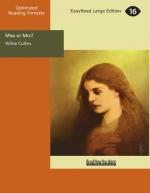“If you only want moral evidence to satisfy your own mind, your end is gained. There is, morally, no doubt that Turlington and the sea-captain who cast the foreign sailor overboard to drown are on e and the same man. Legally, the matter is beset by difficulties, Turlington having destroyed all provable connection between his present self and his past life. There is only one chance for us. A sailor on board the ship (who was in his master’s secrets) is supposed to be still living (under his master’s protection). All the black deeds of Turlington’s early life are known to this man. He can prove the facts, if we can find him, and make it worth his while to speak. Under what alias he is hidden we do not know. His own name is Thomas Wildfang. If we are to make the attempt to find him, not a moment is to be lost. The expenses may be serious. Let me know whether we are to go on, or whether enough has been done to attain the end you have in view.”
Enough had been done—not only to satisfy Launce, but to produce the right effect on Sir Joseph’s mind if Sir Joseph proved obdurate when the secret of the marriage was revealed. Launce wrote a line directing the stoppage of the proceedings at the point which they had now reached. “Here is a reason for her not marrying Turlington,” he said to himself, as he placed the papers under lock and key. “And if she doesn’t marry Turlington,” he added, with a lover’s logic, “why shouldn’t she marry Me?”
EIGHTH SCENE.
The Library.
The next day Sir Joseph Graybrooke, Sir Joseph’s lawyer, Mr. Dicas (highly respectable and immensely rich), and Richard Turlington were assembled in the library at Muswell Hill, to discuss the question of Natalie’s marriage settlement.
After the usual preliminary phrases had been exchanged, Sir Joseph showed some hesitation in openly approaching the question which the little party of three had met to debate. He avoided his lawyer’s eye; and he looked at Turlington rather uneasily.
“Richard,” he began at last, “when I spoke to you about your marriage, on board the yacht, I said I would give my daughter—” Either his courage or his breath failed him at that point. He was obliged to wait a moment before he could go on.
“I said I would give my daughter half my fortune on her marriage,” he resumed. “Forgive me, Richard. I can’t do it!”
Mr. Dicas, waiting for his instructions, laid down his pen and looked at Sir Joseph’s son-in-law elect. What would Mr. Turlington say?
He said nothing. Sitting opposite the window, he rose when Sir Joseph spoke, and placed himself at the other side of the table, with his back to the light.
“My eyes are weak this morning,” he said, in an unnaturally low tone of voice. “The light hurts them.”




